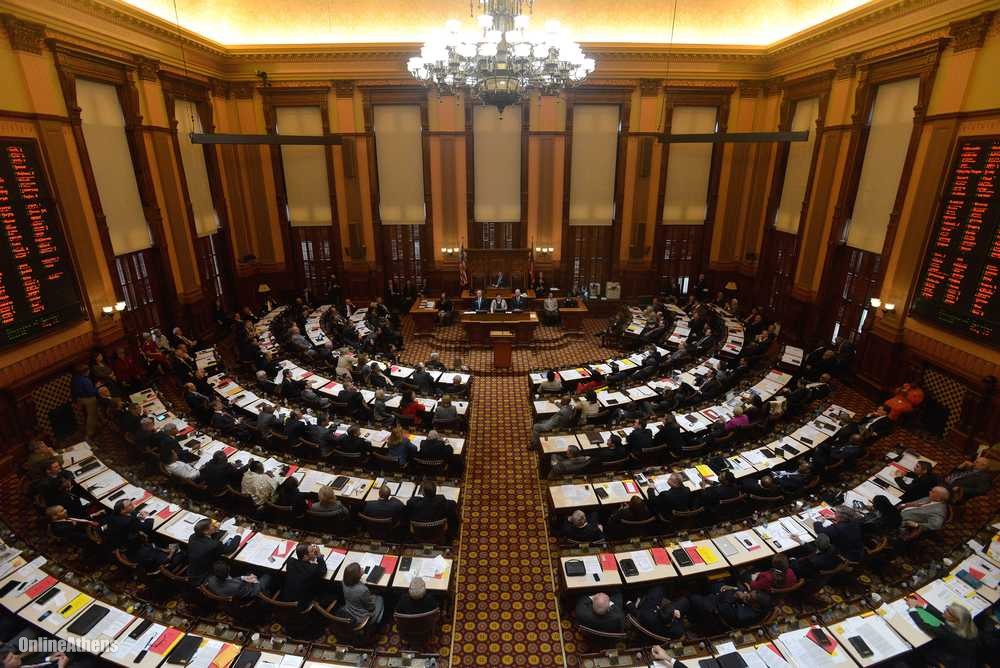Asof midnight on April 2 the 1st session of the 153rd Georgia General Assembly was complete. The final day of the session is referred to as “Sine Die,” which simply means that the General Assembly will be in adjournment until the next calendar year. This General Assembly was charged with solving many of Georgia’s most pressing legislative issues, and it did an exceptional job producing solutions to enhance the welfare of our state.
First and foremost, for an Athens-centered publication, no moment of the Georgia General Assembly was as important as the passage of the so-called “Todd Gurley Bill.” This piece of legislation, affectionately numbered House Bill 3 after Gurley’s jersey number, targets unscrupulous members of the memorabilia industry who entice premier athletes to accept financial rewards. Once signed into law by Gov. Nathan Deal, the state of Georgia will consider persuading a student-athlete to break the NCAA’s policy of accepting monetary rewards a high and aggravated misdemeanor, carrying a penalty of $5,000 or up to 1 year in jail. As a result of the law, student-athletes across the state, but mainly the University of Georgia’s outstanding student-athletes, will now be further protected from these outside pressures. Thanks are due to the bill’s sponsor, Rep. Barry Fleming (R – Harlem), and the rest of the legislators in both chambers who could be heard yelling “Go Dawgs” as the bill passed.

For those looking to celebrate the passage of the Todd Gurley Bill, House Bill 110 will provide Georgians easier access to fireworks. Under this legislation, sponsored by Rep. Jay Roberts (R – Ocilla)the sale of fireworks will now be legal in Georgia. Consequentially, Georgians will no longer have to travel across state lines to buy fireworks. This legislation is projected to create 100 new retail stores and 1,000 jobs across the state. If signed by Gov. Deal, the law will take effect on July 1st, and thus provide for the most explosive Independence Day in Georgia’s history.
Transportation funding, a different kind of an explosive issue, passed both chambers of the legislature late on March 31 (Legislative Day 39). After the House and Senate disagreed on which version of House Bill 170 would be better for Georgia, a conference committee of three Representatives and three Senators was formed to forge a compromise. The agreement, which was reached following extensive closed-door debate, is projected to raise nearly $900 million per year to fund transportation infrastructure. The main components of House Bill 170 include:
- A conversion of the current combination of sales and excise taxes on motor fuel to a single excise tax rate of 26 cents per gallon for motor fuel and 29 cents per gallon for diesel fuel.
- A new fee will be levied on commercial trucks. Trucks ranging from 15,000 to 26,000 pounds will be charged $50 per year, while trucks over 26,000 pounds will be charged $100 per year.
- The $5,000 tax credit for alternative fueled vehicles will be repealed, as well as the implementation of a new $200 per year fee for non-commercial alternative fueled vehicles and a $300 per year fee for commercial alternative fueled vehicles.
The bill received bipartisan support in both chambers; however, it was criticized by many conservative senators who saw it as a tax increase on Georgians.

One of the Senate’s top priorities this session was Senate Bill 1, or “Ava’s Law,” which would mandate state health plans to cover autism for children up to six years old. Although this legislation has been proposed consistently for the past seven years, the House Insurance Committee, chaired by Rep. Richard Smith (R – Columbus), would never pass the legislation due to the additional mandate placed on the insurance industry. Until unforeseen negotiations began late in the session, Ava’s Law seemed destined to die in committee yet again. However, Chairman Smith and the Senate leadership agreed to a compromise which would allow children ages six and younger to receive up to $30,000 in coverage every year. This legislation will take effect as long as Chairman Smith’s proposal of a 0.2 percent statewide sales tax increase – with the revenue dedicated to autism -fails a statewide voter referendum, as expected. Senate Bill 1 was amended into House Bill 429, which passed both chambers unanimously, therefore mandating autism coverage in Georgia state healthcare plans.
Across the Gold Dome, one of the House of Representatives’ biggest priorities was House Bill 1, a piece of legislation related to cannabis oil. Because of the bleak outlook for Ava’s Law, the Senate was expected to either drastically revise the cannabis oil bill or hold it “hostage,” until Ava’s Law was approved. However, due to the compromise regarding autism legislation, House Bill 1 remained largely unchanged in the Senate Health and Human Services Committee and passed the Senate by a wide margin. Gov. Deal has already signed the legislation into law, legalizing the use of cannabis oil for alleviating pain in patients suffering from eight medical conditions including seizure disorders, multiple sclerosis, and sickle cell anemia.
Aside from the priorities of the legislative branch, the Governor’s main prerogative this session was addressing Georgia’s education system through the stimulation of failing schools. Gov. Deal’s proposal includes the creation of an “Opportunity School District.” This district will consist of schools that have been deemed failing for three consecutive years, and will then be subject to takeover by the Opportunity School’s superintendent. The legislation enabling this proposal has passed the House and Senate, and will now be placed on the ballot as a referendum, allowing voters to decide if Georgia will utilize the Opportunity School District. This measure will be before voters on the next general election ballot in 2016, and there is sure to be widespread campaigning both for and against the school takeover plan.
Senate Bill 129, Georgia’s Religious Freedoms Restoration Act, which passed the Senate in early March, failed to move out of the House Judiciary Committee. This controversial bill sponsored by Sen. Josh McKoon (R – Columbus) has received immense attention because of the negative fallout a similar bill has had in Indiana and Arkansas. The concern regarding this legislation is the potential discrimination against the lesbian, gay, bisexual, and transgender (LGBT) community. Gov. Deal has stated that the bill would need to have anti-discrimination language if it were to become law in Georgia. After Rep. Mike Jacobs (R – Brookhaven) attached an amendment clarifying that the legislation would not be used for discriminatory purposes, the legislation was tabled and never reconsidered.

A key aspect of the Georgia General Assembly that is generally controversial – and the only thing that legislators are required to do – is pass a budget. This session’s budget was less controversial than previous years. However, in order to pass the budget a conference committee was still required, and after reaching a compromise on the $21.8 billion budget it overwhelmingly passed both chambers.
Additional legislation that received attention throughout the course of the session, and ultimately passed, included Senate Bill 63, which allows breweries to sell larger quantities of alcohol to patrons, and House Bill 225, which will require Uber and Lyft ride-share drivers to adhere to background checks similar to those for taxi drivers. There is no question that great strides were made during the 1st session of the 153rd General Assembly, and that Georgia is a better state as a result of the legislation which will address some of its most significant problems.
While many of the session’s issues were politically charged, a large Republican majority in both chambers helped to avoid the partisan dead-lock commonly associated with the federal government. Additionally, Gov. Deal’s presence behind the scenes of the legislative process created cohesion between the executive and legislative branches. Because of this, Gov. Deal is not expected to veto much, if any, of the legislation that passed. Gov. Deal said it best when addressing the Senate on the last day of session, “I believe that this session of the General Assembly will probably be marked as one of the most significant sessions in the recent history of this state.” Sine Die!
– By Joseph Hendricks


